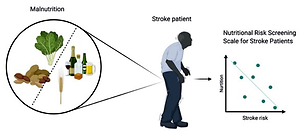Current issue
Archive
Manuscripts accepted
About the Journal
Editorial office
Editorial board
Section Editors
Abstracting and indexing
Subscription
Contact
Ethical standards and procedures
Most read articles
Instructions for authors
Article Processing Charge (APC)
Regulations of paying article processing charge (APC)
CARDIOLOGY / RESEARCH PAPER
Development and validation of a nutritional risk screening scale for stroke patients
1
Department of Neurology, The First Affiliated Hospital, Sun Yat-sen University; Guangdong Provincial Key Laboratory of Diagnosis and Treatment of Major Neurological Diseases, National Key Clinical Department and Key Discipline
of Neurology, Guangzhou, China
2
Neurology Medicine Center, The Seventh Affiliated Hospital (Shen Zhen), Sun Yat-sen University, Guangming (New) Dist., Shenzhen, China
3
Nursing Department, The First Affiliated Hospital, Sun Yat-sen University, Guangzhou, China
Submission date: 2021-06-02
Final revision date: 2021-07-11
Acceptance date: 2021-07-20
Online publication date: 2021-07-27
Corresponding author
Zhang Xiaoyan
Nursing Department, The First Affiliated Hospital, Sun Yat-sen University, 58 Zhongshan Road, Guangzhou 510080, China Phone: +86 20 87332071 E-mail: zhxyan@mail.sysu.edu.cn, drZhangXiaoyan@hotmail.com
Nursing Department, The First Affiliated Hospital, Sun Yat-sen University, 58 Zhongshan Road, Guangzhou 510080, China Phone: +86 20 87332071 E-mail: zhxyan@mail.sysu.edu.cn, drZhangXiaoyan@hotmail.com
KEYWORDS
TOPICS
ABSTRACT
Introduction:
Stroke is a global health problem, and around 62% of stroke patients suffer from malnutrition due to dysphagia, eating speed, or the stress response. This study aimed to develop a Nutritional Risk Screening Scale for Stroke Patients (NRSS-SP).
Material and methods:
In the current study we constructed a theoretical framework by combining stroke characteristics, the risk factors of malnutrition in stroke patients, and clinical experience. Then, using the Delphi method, we formed a pool for entries and combined the opinions and suggestions discussed by experts in a research team. Next, we collected all of the data and information, categorized, merged, and split the pool of entry items’ contents. Finally, we formed a pre test scale comprising 11 items after scoring their importance. A clinical investigation of 100 patients was conducted to test the validation of the NRSS-SP.
Results:
The pre-test NRSS-SP comprised 10 items in three fields: physical, psychological, and independence. A score was assigned to each factor. Disease severity, the serum level of albumin, and dysphagia were assigned 3 points each, and age ≥ 70 years was assigned 1 point. The other indicators were assigned 1–3 points according to the evaluation results. The cumulative effect of four factors (depression, anxiety, serum level of albumin, and body mass index (BMI)) was 65.512%. The item-level content validity index (CVI) of the NRSS-SP ranged from 0.081 to 1.000, and the scale-level CVI was 0.912. The coefficient of Cronbach’s ranged from 0.822 to 0.911.
Conclusions:
An NRSS-SP (which comprised the National Institutes of Health Stroke Scale score, BMI, serum level of albumin, recent weight loss, recent food intake, dysphagia, age, depression, anxiety, and Barthel index) score ≥ 6.5 was classified as a malnourishment risk; an NRSS-SP score < 6.5 denoted normal nutrition.
Stroke is a global health problem, and around 62% of stroke patients suffer from malnutrition due to dysphagia, eating speed, or the stress response. This study aimed to develop a Nutritional Risk Screening Scale for Stroke Patients (NRSS-SP).
Material and methods:
In the current study we constructed a theoretical framework by combining stroke characteristics, the risk factors of malnutrition in stroke patients, and clinical experience. Then, using the Delphi method, we formed a pool for entries and combined the opinions and suggestions discussed by experts in a research team. Next, we collected all of the data and information, categorized, merged, and split the pool of entry items’ contents. Finally, we formed a pre test scale comprising 11 items after scoring their importance. A clinical investigation of 100 patients was conducted to test the validation of the NRSS-SP.
Results:
The pre-test NRSS-SP comprised 10 items in three fields: physical, psychological, and independence. A score was assigned to each factor. Disease severity, the serum level of albumin, and dysphagia were assigned 3 points each, and age ≥ 70 years was assigned 1 point. The other indicators were assigned 1–3 points according to the evaluation results. The cumulative effect of four factors (depression, anxiety, serum level of albumin, and body mass index (BMI)) was 65.512%. The item-level content validity index (CVI) of the NRSS-SP ranged from 0.081 to 1.000, and the scale-level CVI was 0.912. The coefficient of Cronbach’s ranged from 0.822 to 0.911.
Conclusions:
An NRSS-SP (which comprised the National Institutes of Health Stroke Scale score, BMI, serum level of albumin, recent weight loss, recent food intake, dysphagia, age, depression, anxiety, and Barthel index) score ≥ 6.5 was classified as a malnourishment risk; an NRSS-SP score < 6.5 denoted normal nutrition.
Share
RELATED ARTICLE
We process personal data collected when visiting the website. The function of obtaining information about users and their behavior is carried out by voluntarily entered information in forms and saving cookies in end devices. Data, including cookies, are used to provide services, improve the user experience and to analyze the traffic in accordance with the Privacy policy. Data are also collected and processed by Google Analytics tool (more).
You can change cookies settings in your browser. Restricted use of cookies in the browser configuration may affect some functionalities of the website.
You can change cookies settings in your browser. Restricted use of cookies in the browser configuration may affect some functionalities of the website.



